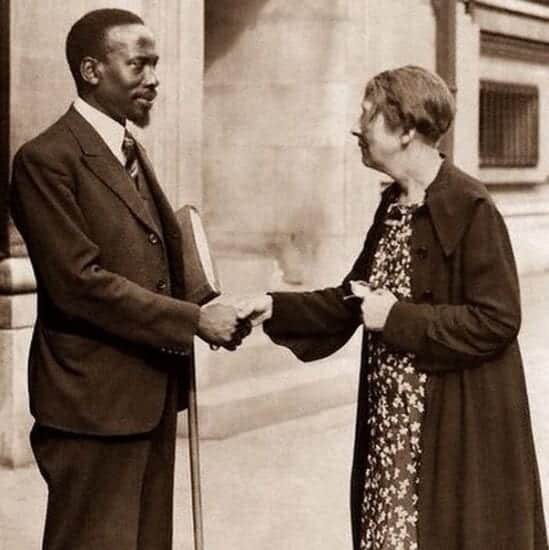Did you know that Jomo Kenyatta could speak German?

Did you know that Jomo Kenyatta could speak German? Jomo Kenyatta must have also been fluent in Russian too, to a certain good extent.
During Jomo Kenyatta’s 38th memorial service of 22nd August 2016 at Holy Family Cathedral in Nairobi, President Uhuru Kenyatta invited the Rt. Hon. Raila Odinga to say a word. Raila Odinga studied in what was then known as East Germany and still remains fluent in German.
Raila Odinga spoke of a time around the year 1965, when he had come home on holiday. His father Oginga Odinga was then Kenyan Vice President. Jomo Kenyatta, then Kenyan President, had visited the Odingas at their Kisumu home, and while being introduced to the Odinga family, was told that Raila studied in East Germany and was home on holiday. “Really?”, Jomo Kenyatta responded, upon which Jomo Kenyatta began a conversation in German with Raila that lasted about five minutes.
Everyone else in the room was dumbfounded, no one else in the room understood German, and no one else in the room understood what Jomo & Raila were discussing. Interesting, right?
And why must Jomo also have been fluent in Russian too to a certain extent?
Jomo Kenyatta was in Europe for a total of 16 years. What was then known as the Kikuyu Central Association (KCA), sent Jomo Kenyatta (then Johnstone Kenyatta), to the United Kingdom in 1929 to articulate the grievances of Kenyan Kikuyus to the British Colonial Secretary. The Kikuyu Central Association (KCA), later morphed into the Kenya African Union (KAU), and then the Kenya African National Union (KANU).
Jomo Kenyatta returned back to Kenya in 1930 “empty handed”, spent a few months in Kenya, and was again re-deployed by the KCA in 1931 to the United Kingdom to once again engage the British Colonial Secretary on reforms in Kenya’s Kikuyu community. What worked to Jomo’s tremendous advantage is that he and James Beauttah were the only KCA members at the time who could speak English. Initially, it was the then KCA Secretary-General Joseph Kangethe, after whom Nairobi’s Joseph Kangethe Road and Joseph Kangethe Social Hall are named, who was chosen to go to the United Kingdom in 1929, but Joseph Kangethe could not speak English. The KCA were most certainly disappointed that Jomo had come back “empty handed” in 1930, and would have preferred to send James Beauttah to the United Kingdom on the second assignment in 1931, but Beauttah had gotten a good job in Uganda with the then equivalent of the East African Postal Services, thus declining the KCA offer.
So Jomo again lands in the United Kingdom in 1931 where he would be for the next 15 years i.e. until 1946. At a certain point during his second stay in Europe of 1931 to 1946, Jomo decided to experiment with Communism, moving to Moscow with George Padmore, after whom Nairobi’s George Padmore Road is named. This was before the outbreak of World War II. Both were enrolled into some sort of induction program for new “converts” to Communism.
The brand of Communism practised by the Russians was very demanding and indoctrinating, verging on fanaticism, and Jomo found this overbearing and overwhelming. The legend goes that amongst other things, Jomo was expected to renounce his beliefs and loyalties to Kikuyu Customary Law, and adopt Communism as his new “religion”. Jomo and Padmore, who was from the Caribbean, both resisted going this far, and the Russians became suspicious of both, feeling they were British spies. Someone tipped Jomo and Padmore that they would be eliminated by the Russians, and both took a chance, and escaped in the dead of the night. They were lucky and spent days and nights on the run between Moscow and London, sometimes walking on foot, sometimes hiking lifts on trucks, and sometimes as stowaways on trains. Lucky for them, there were no satellites, cell phones or GPS in those days. Jomo never liked talking about his time in Russia for the rest of his life.
Jomo and Raila communicating in German, is reminiscent of a similar exchange in Kikuyu between Jomo Kenyatta and Dr. Louis Leakey in London around the year 1938. Dr. Louis Leakey (father of Dr. Richard Leakey, Dr. Jonathan Leakey and Hon. Philip Leakey) and Dr. Louis Leakey’s father Canon Harry Leakey both spoke impeccable Kikuyu, and both Canon Harry Leakey and Dr. Louis Leakey are credited with the most thorough compilation on Kikuyu Customary Law i.e. “The Southern Kikuyu before 1903”. Not even Jomo Kenyatta’s “Facing Mt. Kenya” of 1938 is as detailed or as revered as “The Southern Kikuyu before 1903”.
The legend goes that Dr. Louis Leakey was in London around the year 1938 attending a conference on African culture, with Dr. Leakey at the head of a delegation that opposed female circumcision amongst the Kikuyu. Jomo Kenyatta was at the same conference, with Jomo supporting female circumcision amongst the Kikuyu.
Things got heated at a certain point, the legend goes, with Jomo and Dr. Leakey going at each other in Kikuyu in a hostile “no holds barred” verbal exchange. The legend goes that they insulted each other heavily in Kikuyu for about a minute or two, almost coming to blows. As in 1965 above, the audience in 1938 was also dumbfounded and perplexed, wondering what language the White man (Dr. Leakey) and Black man (Jomo), on stage were communicating in. Both men became good friends after this and remained so until 1972 when Dr. Louis Leakey passed away. Interesting, right? Behind every legend/”word of mouth account” is a good amount of truth, right?
By Mundia Kamau
Did you know that Jomo Kenyatta could speak German?







